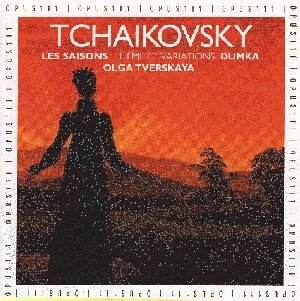Pyotr Il'yich TCHAIKOVSKY
The Seasons Op.37b
Dumka
Theme and Variations
 Olga Tverskaya (playing on
an Erard Piano of 1867, restored by David Winston)
Olga Tverskaya (playing on
an Erard Piano of 1867, restored by David Winston)
 OPUS 111 OPS 30-304
[61.38] DDD (Supplied with a free sampler disc of Russian Works)
recorded January 2000 at Great Dixter House,
Kent.
OPUS 111 OPS 30-304
[61.38] DDD (Supplied with a free sampler disc of Russian Works)
recorded January 2000 at Great Dixter House,
Kent.
Crotchet

People will buy this disc primarily for the Seasons, not the free sampler
disc, so all I will say about the latter is that it will allow you to hear
short excerpts from other discs in OPUS 111 catalogue, celebrating 1000 years
of Russian Music. The excerpts include instrumental, choral and orchestral
pieces, all of which appear to be complete.
The Seasons is a selection of short piano works, which Tchaikovsky wrote,
intending each for publication in a monthly magazine, the Novelist during
the year of 1876. The word Seasons should more accurately be the Month, but
this does not have the same ring to it so I suppose we should all get on
with Tchaikovsky's idea that there are 12 Seasons in the Year. Did he write
one per month?? No, the first half of the year was reasonable, but as he
was planning an overseas trip in the second half of 1876, he wrote the last
seven together and sent them off to the magazine for them to publish for
the remainder of the year.
The cycle is played beautifully here by Olga Tverskaya on a period piano
by Erard of 1867, lovingly restored by David Winston. The piano was supplied
for this recording courtesy of Peter and Joyce Brotherton, and was recorded
in the flattering acoustic of Great Dixter House in Kent.
Many enthusiasts will have heard Michel Pletnev's reference recording, and
if you have this, the current recording is a complimentary issue, not in
direct competition. Olga Tverskaya's playing is of a totally different kind,
plus the sound of the period piano is much more mellow than on Pletnev's
disc.
The first section, (January) for example, is extremely fluid in the CPO recording
taking only 4'07", against Pletnev's 6'17". Not all the sections show such
a variation, and neither pianist is consistently faster or slower. If we
then compare with the Erato recording of Victoria Postnikova, there are similar
variations again, and so there is no right way to play these lovely pieces.
I did find, however, that I wanted to play Olga Tverskaya's recording right
through, and it gave me much enjoyment.
The two shorter pieces are lesser works, but still receive the same immaculate
treatment from the young soloist, who came to London and is now resident
here. She specialises mainly in the playing of forte piano, and I look forward
to future issues of hers.
The period piano is not completely free from extraneous noises, but there
is not enough to mar your enjoyment, the recording is first class, and the
notes, whilst shortened to allow the trilingual approach are more than
satisfactory. This, plus a free disc, what more could we want?
John Phillips

